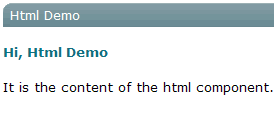The simplest way is to use a XUL component called html to embed whatever HTML tags you want to send directly to the browser. To avoid ZK from interpreting the HTML tags, you usually enclose them with <![CDATA[ and ]]>. In other words, they are not the child component. Rather, they are stored in the content property. Notice you can use EL expressions in it.

<window id="win" title="Html Demo">
<html><![CDATA[
<h4>Hi, ${win.title}</h4>
<p>It is the content of the html component.</p>
]]></html>
</window>
where <h4>...</p> will become the content of the html element (see also the getContent method of the org.zkoss.zul.Html class).
The html component generates the HTML SPAN tag to enclose the content. In other words, it generates the following HTML tags when rendered to the browser.
<span id=”...”> <h4>Hi, Html Demo</h4> <p>It is the content of the html component.</p> </span>